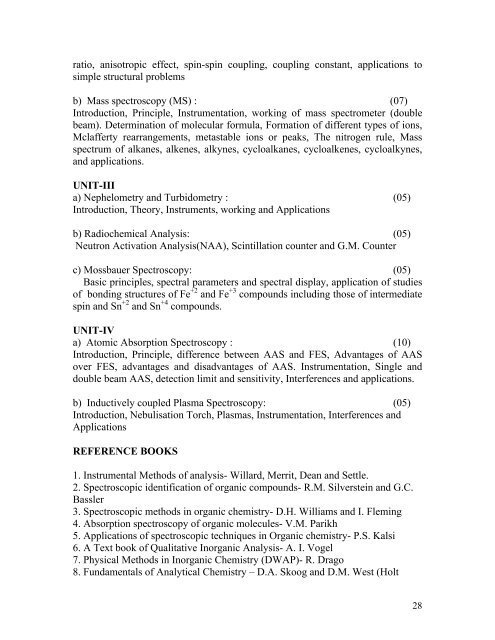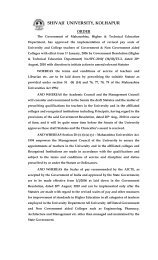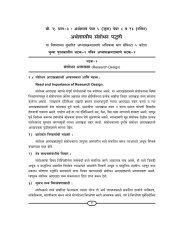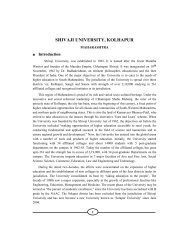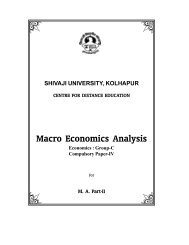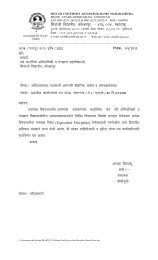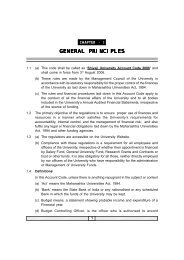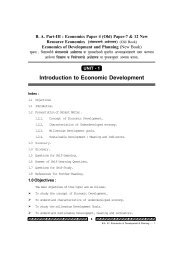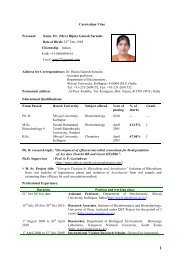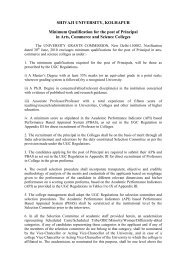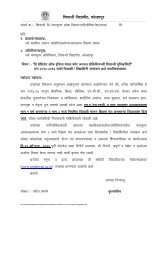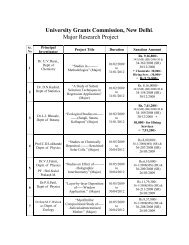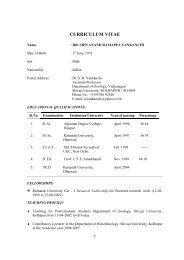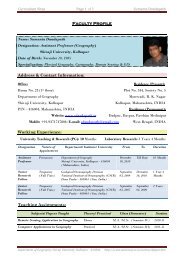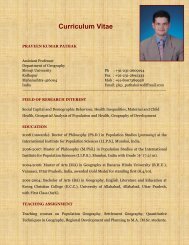M.Sc. Chemistry Syllabus Revised Implemented ... - Shivaji University
M.Sc. Chemistry Syllabus Revised Implemented ... - Shivaji University
M.Sc. Chemistry Syllabus Revised Implemented ... - Shivaji University
You also want an ePaper? Increase the reach of your titles
YUMPU automatically turns print PDFs into web optimized ePapers that Google loves.
atio, anisotropic effect, spin-spin coupling, coupling constant, applications to<br />
simple structural problems<br />
b) Mass spectroscopy (MS) : (07)<br />
Introduction, Principle, Instrumentation, working of mass spectrometer (double<br />
beam). Determination of molecular formula, Formation of different types of ions,<br />
Mclafferty rearrangements, metastable ions or peaks, The nitrogen rule, Mass<br />
spectrum of alkanes, alkenes, alkynes, cycloalkanes, cycloalkenes, cycloalkynes,<br />
and applications.<br />
UNIT-III<br />
a) Nephelometry and Turbidometry : (05)<br />
Introduction, Theory, Instruments, working and Applications<br />
b) Radiochemical Analysis: (05)<br />
Neutron Activation Analysis(NAA), <strong>Sc</strong>intillation counter and G.M. Counter<br />
c) Mossbauer Spectroscopy: (05)<br />
Basic principles, spectral parameters and spectral display, application of studies<br />
of bonding structures of Fe +2 and Fe +3 compounds including those of intermediate<br />
spin and Sn +2 and Sn +4 compounds.<br />
UNIT-IV<br />
a) Atomic Absorption Spectroscopy : (10)<br />
Introduction, Principle, difference between AAS and FES, Advantages of AAS<br />
over FES, advantages and disadvantages of AAS. Instrumentation, Single and<br />
double beam AAS, detection limit and sensitivity, Interferences and applications.<br />
b) Inductively coupled Plasma Spectroscopy: (05)<br />
Introduction, Nebulisation Torch, Plasmas, Instrumentation, Interferences and<br />
Applications<br />
REFERENCE BOOKS<br />
1. Instrumental Methods of analysis- Willard, Merrit, Dean and Settle.<br />
2. Spectroscopic identification of organic compounds- R.M. Silverstein and G.C.<br />
Bassler<br />
3. Spectroscopic methods in organic chemistry- D.H. Williams and I. Fleming<br />
4. Absorption spectroscopy of organic molecules- V.M. Parikh<br />
5. Applications of spectroscopic techniques in Organic chemistry- P.S. Kalsi<br />
6. A Text book of Qualitative Inorganic Analysis- A. I. Vogel<br />
7. Physical Methods in Inorganic <strong>Chemistry</strong> (DWAP)- R. Drago<br />
8. Fundamentals of Analytical <strong>Chemistry</strong> – D.A. Skoog and D.M. West (Holt<br />
28


